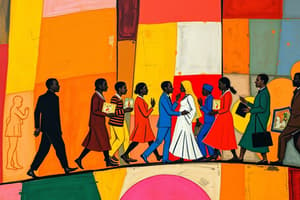Podcast
Questions and Answers
Which term refers to the movement of individuals, families, households, or other categories of people between social strata in a society?
Which term refers to the movement of individuals, families, households, or other categories of people between social strata in a society?
- Social mobility (correct)
- Absolute mobility
- Intergenerational mobility
- Intragenerational mobility
What type of mobility occurs when individuals experience a change in social status relative to their current social location within a given society?
What type of mobility occurs when individuals experience a change in social status relative to their current social location within a given society?
- Occupational mobility
- Intragenerational mobility (correct)
- Intergenerational mobility
- Absolute mobility
Which measure is often used to quantitatively measure mobility in terms of changes in income or wealth?
Which measure is often used to quantitatively measure mobility in terms of changes in income or wealth?
- Education
- Occupation
- Social class
- Absolute mobility (correct)
What type of mobility occurs between different generations, where children or grandchildren are in economic circumstances better than those of their parents or grandparents?
What type of mobility occurs between different generations, where children or grandchildren are in economic circumstances better than those of their parents or grandparents?
Which term describes the movement in a downward or upward direction within social stratification layers or tiers in an open system?
Which term describes the movement in a downward or upward direction within social stratification layers or tiers in an open system?
Which type of mobility is less frequent and represents cases of upward mobility, often referred to as 'rags to riches' stories?
Which type of mobility is less frequent and represents cases of upward mobility, often referred to as 'rags to riches' stories?
Which term refers to the progress of a society in areas such as education, health, housing, and job opportunities, and compares it across generations?
Which term refers to the progress of a society in areas such as education, health, housing, and job opportunities, and compares it across generations?
Which measure is used to predict, discuss, and learn more about an individual or group's mobility in society?
Which measure is used to predict, discuss, and learn more about an individual or group's mobility in society?
Which term describes a society where at least some value is given to achieved status characteristics?
Which term describes a society where at least some value is given to achieved status characteristics?
Which type of mobility is more common in the US and is often associated with the 'American Dream'?
Which type of mobility is more common in the US and is often associated with the 'American Dream'?
Which parenting style is more common among lower- and working-class parents?
Which parenting style is more common among lower- and working-class parents?
Which social class is more likely to spend more time with their children at early ages?
Which social class is more likely to spend more time with their children at early ages?
What is the term used to describe the advantage a person has that gives them a higher status in society?
What is the term used to describe the advantage a person has that gives them a higher status in society?
Which type of capital includes economic resources such as cash and credit?
Which type of capital includes economic resources such as cash and credit?
Which type of capital includes resources achieved based on group membership and relationships with other people?
Which type of capital includes resources achieved based on group membership and relationships with other people?
What determines the chances for social mobility?
What determines the chances for social mobility?
What is the term used to describe the parenting style of middle-class and upper-class parents?
What is the term used to describe the parenting style of middle-class and upper-class parents?
What percentage of college applicants from every socioeconomic class are equally qualified?
What percentage of college applicants from every socioeconomic class are equally qualified?
Which social class is more oriented toward formal reasoning and abstract thought?
Which social class is more oriented toward formal reasoning and abstract thought?
What effect does the environment have on a person's cultural resources?
What effect does the environment have on a person's cultural resources?
Which factor is NOT mentioned as a potential explanation for differences in social mobility at different times and places?
Which factor is NOT mentioned as a potential explanation for differences in social mobility at different times and places?
What is the relationship between social class and a child's chances for obtaining a quality education?
What is the relationship between social class and a child's chances for obtaining a quality education?
What has happened to the gap in college graduation rates between the rich and the poor over the past few decades?
What has happened to the gap in college graduation rates between the rich and the poor over the past few decades?
What has happened to average family income and social status for the bottom third of all children between 1975 and 2011?
What has happened to average family income and social status for the bottom third of all children between 1975 and 2011?
What is the likelihood of a child born to parents in the lowest quintile ending up in the highest quintile as an adult?
What is the likelihood of a child born to parents in the lowest quintile ending up in the highest quintile as an adult?
What is the relationship between technological advancements and income levels?
What is the relationship between technological advancements and income levels?
What is the difference between absolute mobility and relative mobility?
What is the difference between absolute mobility and relative mobility?
What is stickiness concerning mobility?
What is stickiness concerning mobility?
What is the impact of socioeconomic inequality on social mobility in the United States?
What is the impact of socioeconomic inequality on social mobility in the United States?
What is one of the most promising chances of upward social mobility and attaining a higher social status?
What is one of the most promising chances of upward social mobility and attaining a higher social status?
Flashcards
Social Mobility
Social Mobility
The movement of individuals or groups between different social positions in a society.
Intra-generational Mobility
Intra-generational Mobility
Changes in social status within a person's lifetime.
Inter-generational Mobility
Inter-generational Mobility
Changes in social status comparing generations, like parents and children.
Vertical Mobility
Vertical Mobility
Signup and view all the flashcards
Upward Mobility
Upward Mobility
Signup and view all the flashcards
Income/Wealth
Income/Wealth
Signup and view all the flashcards
Socioeconomic Status (SES)
Socioeconomic Status (SES)
Signup and view all the flashcards
Meritocratic Society
Meritocratic Society
Signup and view all the flashcards
Open System
Open System
Signup and view all the flashcards
Authoritarian Parenting
Authoritarian Parenting
Signup and view all the flashcards
Concerted Cultivation Parenting
Concerted Cultivation Parenting
Signup and view all the flashcards
Social Class and Education
Social Class and Education
Signup and view all the flashcards
Cultural Resources
Cultural Resources
Signup and view all the flashcards
American Dream
American Dream
Signup and view all the flashcards
Gap in College Graduation Rates
Gap in College Graduation Rates
Signup and view all the flashcards
Decrease in Social Status for Lower-Income Families
Decrease in Social Status for Lower-Income Families
Signup and view all the flashcards
Social Class and Education
Social Class and Education
Signup and view all the flashcards
Stickiness of Social Class
Stickiness of Social Class
Signup and view all the flashcards
Technological Advancements and Social Mobility
Technological Advancements and Social Mobility
Signup and view all the flashcards
Absolute Mobility
Absolute Mobility
Signup and view all the flashcards
Relative Mobility
Relative Mobility
Signup and view all the flashcards
Socioeconomic Inequality
Socioeconomic Inequality
Signup and view all the flashcards
College Education
College Education
Signup and view all the flashcards
Closed System
Closed System
Signup and view all the flashcards
Ascriptive Society
Ascriptive Society
Signup and view all the flashcards
Downward Mobility
Downward Mobility
Signup and view all the flashcards
Structural Mobility
Structural Mobility
Signup and view all the flashcards
Individualism
Individualism
Signup and view all the flashcards
Structural Inequality
Structural Inequality
Signup and view all the flashcards
Social Opportunity
Social Opportunity
Signup and view all the flashcards
Social Barriers
Social Barriers
Signup and view all the flashcards
Study Notes
Social Mobility
- Refers to the movement of individuals, families, households, or other categories of people between social strata in a society.
Types of Mobility
- Intra-generational mobility: occurs when individuals experience a change in social status relative to their current social location within a given society.
- Inter-generational mobility: occurs between different generations, where children or grandchildren are in economic circumstances better than those of their parents or grandparents.
- Vertical mobility: the movement in a downward or upward direction within social stratification layers or tiers in an open system.
- Upward mobility: less frequent, represents cases of upward mobility, often referred to as 'rags to riches' stories.
Measures of Mobility
- Income or wealth: often used to quantitatively measure mobility.
- Socioeconomic status: used to predict, discuss, and learn more about an individual or group's mobility in society.
Social Systems
- Meritocratic society: a society where at least some value is given to achieved status characteristics.
- Open system: a society where social mobility is possible.
Parenting Styles
- Lower- and working-class parents: more common among authoritarian parents.
- Middle-class and upper-class parents: more common among concerted cultivation parents.
Social Class and Education
- Social class: determines the chances for social mobility.
- Upper-class parents: more likely to spend more time with their children at early ages.
- Cultural resources: the environment has an impact on a person's cultural resources.
Social Mobility in the US
- American Dream: associated with upward mobility.
- Gap in college graduation rates: has increased between the rich and the poor over the past few decades.
- Average family income and social status: has decreased for the bottom third of all children between 1975 and 2011.
- Child's chances for obtaining a quality education: related to social class.
- Stickiness: refers to the difficulty of upward mobility.
Other Factors
- Technological advancements: have an impact on income levels.
- Absolute mobility: refers to the movement of individuals up or down the social ladder.
- Relative mobility: refers to the movement of individuals relative to their peers.
- Socioeconomic inequality: has a negative impact on social mobility in the United States.
- College education: one of the most promising chances of upward social mobility and attaining a higher social status.
Studying That Suits You
Use AI to generate personalized quizzes and flashcards to suit your learning preferences.



